Daily Vocabulary Words: List of Daily Used Words in Leading Indian Newspapers
Hi there. Welcome to this special section @ Wordpandit. Our endeavour here is straightforward: highlighting daily vocabulary words that you would come across in leading newspapers in the country. We have included the following newspapers in our selection:
• The Times of India
• The Economic Times
• Hindustan Times
• Mint
• Indian Express
We are putting in extensive work to develop your vocabulary. All you have to do is be regular with this section and check out this post daily. This is your repository of commonly used words; essentially, we are posting a list of daily used words. Hence, this has significant practical application as it teaches you words that are commonly used in leading publications mentioned above.
Visit the website daily to learn words from leading Indian newspapers.
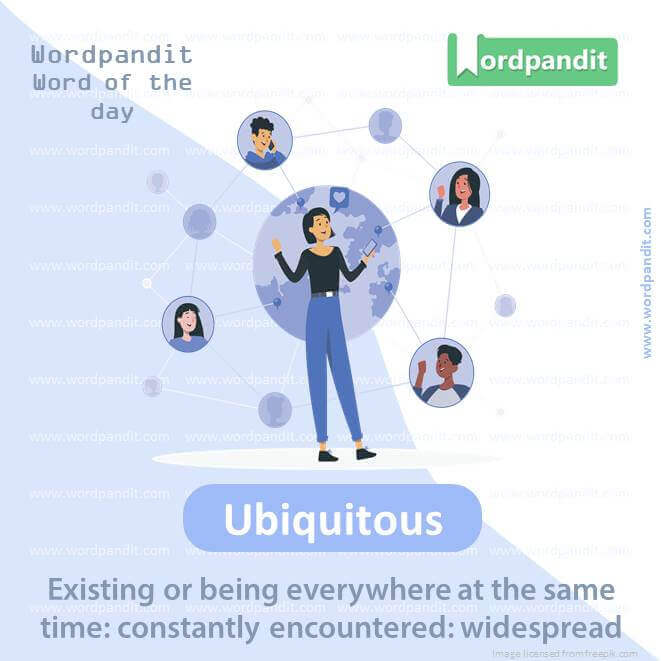
WORD-1: UBIQUITOUS
CONTEXT: “The ubiquitous presence of digital technology in our lives has reshaped how we interact with the world.”
SOURCE: The Times of India
EXPLANATORY PARAGRAPH: Think about your favorite toy that seems to be everywhere you look in your house. When something is “ubiquitous”, it means it’s found everywhere. So, if you see something all the time, everywhere you go, you can say it’s ubiquitous!
MEANING: Existing or being everywhere at the same time: constantly encountered: widespread (adjective).
PRONUNCIATION: You-bi-kwuh-tus
SYNONYMS: Everywhere, omnipresent, universal, all-over, pervasive, widespread, prevalent
USAGE EXAMPLES:
1. Cell phones have become ubiquitous in our society.
2. The sound of music was ubiquitous during the festival.
3. She is a ubiquitous presence in the town’s social events.
4. Ubiquitous advertisements can be seen all over the city.
WORD-2: LINEAGE
CONTEXT: “The royal family’s lineage traces back centuries, and their legacy is still evident in many aspects of modern society.”
SOURCE: Hindustan Times
EXPLANATORY PARAGRAPH: Imagine your family tree, where you have your grandparents, parents, and maybe your aunts, uncles, and cousins. “Lineage” is like that family tree, showing who is connected to whom in a family from the past to now.
MEANING: Direct descent from an ancestor; ancestry or pedigree (noun).
PRONUNCIATION: Lin-ee-ij
SYNONYMS: Ancestry, descent, pedigree, bloodline, family tree, heritage, genealogy
USAGE EXAMPLES:
1. The princess traced her lineage back to ancient kings.
2. The puppy’s lineage shows he comes from a line of champions.
3. The lineage of the house dates back to the 18th century.
4. She was proud of her noble lineage.
WORD-3: BLINKERED
CONTEXT: “Critics argue that the government’s blinkered approach towards renewable energy will have long-term consequences.”
SOURCE: Indian Express
EXPLANATORY PARAGRAPH: Have you seen horses wearing something on their eyes when they walk in the city? These are called “blinkers”. They make sure horses only look straight ahead and not get scared. When we say someone is “blinkered”, it’s like they’re only seeing one thing and ignoring everything else.
MEANING: Having a narrow view or limited understanding of something (adjective).
PRONUNCIATION: Blink-erd
SYNONYMS: Narrow-minded, short-sighted, limited, tunnel-visioned, prejudiced, biased, one-sided
USAGE EXAMPLES:
1. His blinkered views on culture prevented him from appreciating diversity.
2. A blinkered approach to education ignores the needs of many students.
3. Her experiences abroad made her realize her previously blinkered perspective.
4. Avoid a blinkered attitude when discussing complex issues.
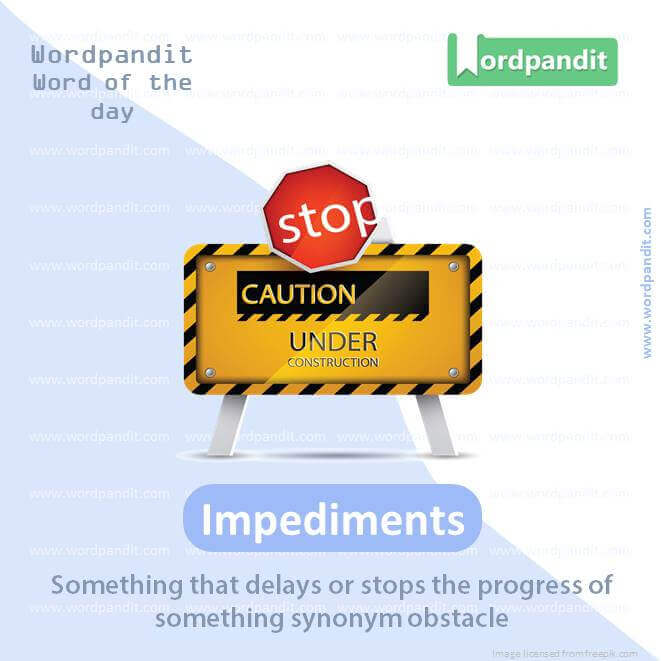
WORD-4: IMPEDIMENTS
CONTEXT: “Infrastructure impediments have been a consistent challenge for the burgeoning e-commerce sector in the country.”
SOURCE: The Economic Times
EXPLANATORY PARAGRAPH: Imagine you’re trying to run, but there are big rocks in your way. Those rocks are like “impediments”. An impediment is something that stops or slows you down from doing what you want to do.
MEANING: Something that delays or stops the progress of something synonym obstacle (noun).
PRONUNCIATION: Im-ped-ih-ments
SYNONYMS: Obstacles, barriers, hurdles, blockages, hindrances, obstructions, deterrents
USAGE EXAMPLES:
1. The company faced several impediments to its expansion plans.
2. Lack of funds was a major impediment to the project’s completion.
3. She overcame all impediments to achieve her dreams.
4. The mountain pass had many natural impediments.
WORD-5: ENSHRINED
CONTEXT: “The right to free speech, enshrined in the constitution, has become a focal point of debates in recent months.”
SOURCE: Live Mint
EXPLANATORY PARAGRAPH: Think about your favorite toy or picture that you keep in a special place because it’s so important to you. When something is “enshrined”, it means it’s kept in a special place or way because it’s important or valuable.
MEANING: To preserve or cherish something in a way that shows deep respect (verb).
PRONUNCIATION: En-shrynd
SYNONYMS: Preserved, protected, cherished, treasured, venerated, sanctified, consecrated
USAGE EXAMPLES:
1. The constitution enshrined the rights of the citizens.
2. Their love story is enshrined in many songs and tales.
3. The church enshrined the relic in a golden case.
4. Her memories were enshrined in the diary she kept.
WORD-6: LAMENT
CONTEXT: Citizens lament the deterioration of green spaces in urban environments, calling for more sustainable city planning.
SOURCE: The Times of India
EXPLANATORY PARAGRAPH:
When you’re really sad about losing your toy and you tell your mom or dad about how much you miss it, you’re doing something called “lament”. It’s when you express sadness or regret about something.
MEANING:
To express sorrow, regret, or unhappiness about something (verb).
PRONUNCIATION:
Luh-ment
SYNONYMS:
Mourn, grieve, bemoan, bewail, rue, regret, sorrow
USAGE EXAMPLES:
1. She lamented the loss of her childhood home.
2. The poet lamented the passing of his youth in his verses.
3. They lamented the fact that they could not save the old tree.
4. The community gathered to lament the loss of a local hero.
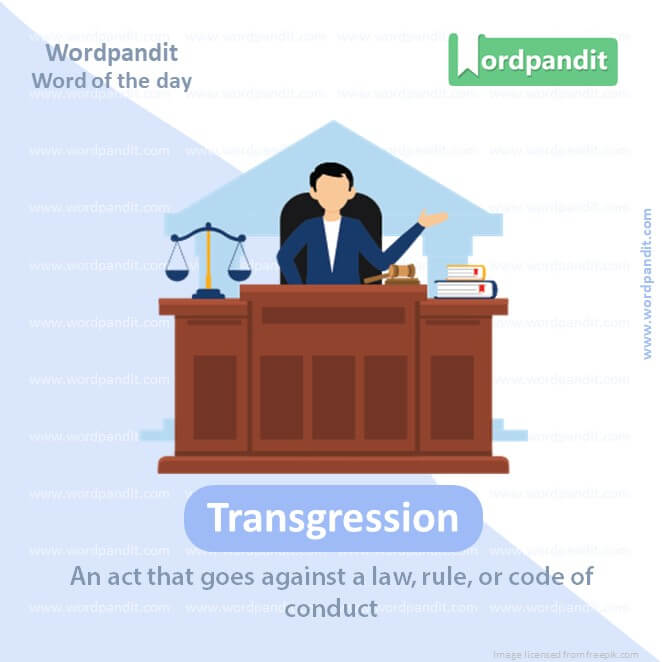
WORD-7: TRANSGRESSION
CONTEXT: The report detailed the multiple transgressions committed by the company, leading to environmental degradation.
SOURCE: The Hindu
EXPLANATORY PARAGRAPH: Imagine you have rules at home, like no jumping on the bed. If you jump anyway, you broke the rule. “Transgression” is a fancy word for doing something you’re not supposed to.
MEANING: An act that goes against a law, rule, or code of conduct (noun).
PRONUNCIATION: trans-GRESH-un
SYNONYMS: Offense, sin, crime, violation, misdemeanor, infringement
USAGE EXAMPLE:
1. His transgressions were too many to ignore.
2. She asked for forgiveness for her past transgressions.
3. The law is clear about the penalties for such transgressions.
4. The community was shocked by the young man’s transgression.
WORD-8: BLOOMBERG
CONTEXT: In a recent interview with Bloomberg, the Finance Minister shed light on the new economic reforms proposed for the upcoming year.
SOURCE: The Economic Times
EXPLANATORY PARAGRAPH:
“Bloomberg” isn’t just a word; it’s the name of a big company that tells us news about money and business. People listen to Bloomberg to understand what’s happening in the world of money, like how much things cost or how businesses are doing.
MEANING:
A major global provider of financial news and information (proper noun).
PRONUNCIATION:
Bloom-berg
SYNONYMS:
(Note: It’s a proper noun, so direct synonyms are tricky. However, here are other financial news outlets.)
Reuters, CNBC, Financial Times, The Wall Street Journal, Business Insider, Forbes
USAGE EXAMPLES:
1. Bloomberg reported a rise in stock market prices today.
2. She read the latest business trends on Bloomberg.
3. The Bloomberg terminal is widely used in the finance industry.
4. The company’s IPO was covered in detail by Bloomberg.
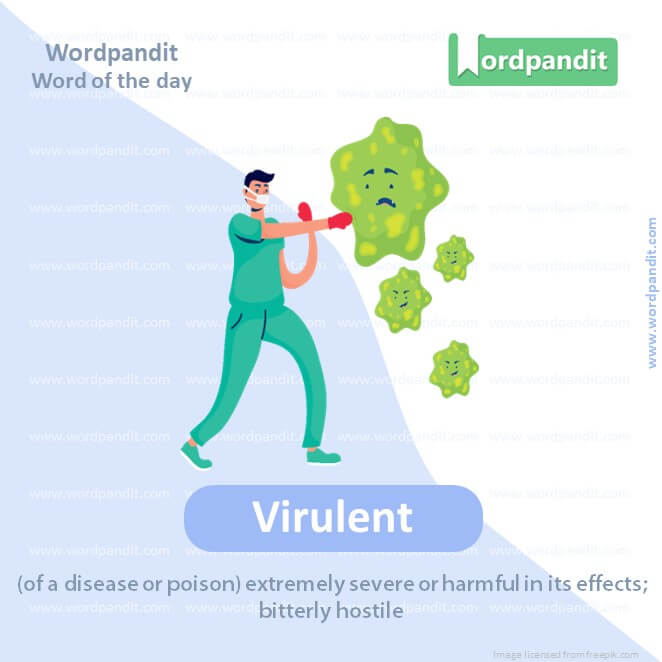
WORD-9: VIRULENT
CONTEXT: The virulent strain of the virus has prompted health officials to issue strict guidelines for travel and public gatherings.
SOURCE: The Hindu
EXPLANATORY PARAGRAPH: “Virulent” is like the strongest villain in a superhero movie. It’s something very harmful or bad. If a bug or germ is virulent, it can make you very sick.
MEANING: (of a disease or poison) extremely severe or harmful in its effects; bitterly hostile (adjective).
PRONUNCIATION: VIR-yuh-lent
SYNONYMS: Toxic, venomous, noxious, malicious, hostile, caustic
USAGE EXAMPLE:
1. The snake’s bite released a virulent venom.
2. He had a virulent hatred for his enemies.
3. The disease was virulent and spread quickly.
4. She received virulent criticism for her actions.
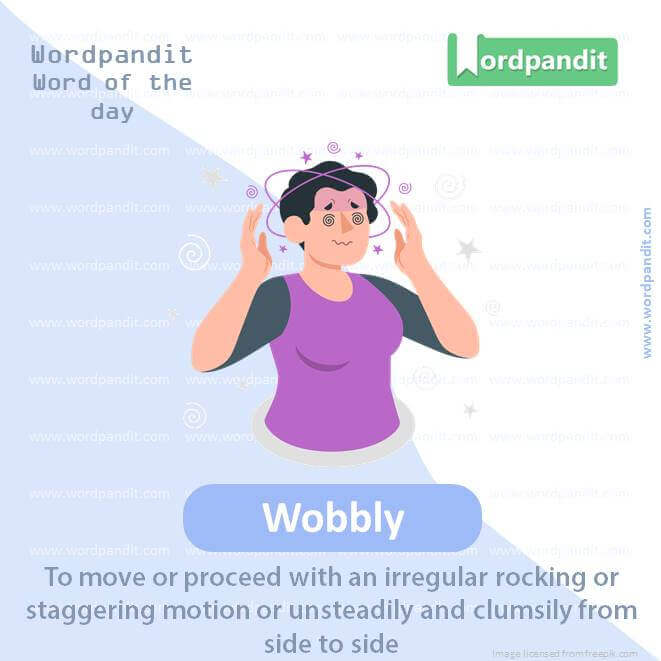
WORD-10: WOBBLY
CONTEXT: The stock market took a wobbly turn yesterday, with major indices dropping by 3%.
SOURCE: Indian Express
EXPLANATORY PARAGRAPH:
Imagine trying to balance on one foot, and you feel like you might fall. That shaky feeling is what “wobbly” means. When something is wobbly, it’s not steady and might fall or break.
MEANING:To move or proceed with an irregular rocking or staggering motion or unsteadily and clumsily from side to side(adjective).
PRONUNCIATION:
Wob-lee
SYNONYMS:
Unsteady, shaky, teetering, tottering, rickety, unstable, precarious
USAGE EXAMPLES:
1. The table was wobbly, so we put a book under one of its legs.
2. After the long run, her legs felt wobbly
3. The ladder was too wobbly to climb safely.
4. He drew a wobbly line on the paper.
Vocabulary Words
When delving into the dynamic world of languages, the grandeur of ‘vocabulary words’ is all-encompassing. The importance of ‘vocabulary words’ in effective communication cannot be overstated; it’s these words that form the backdrop of any language, painting intricate pictures of thoughts and ideas.
Starting on the journey of learning ‘vocabulary words’, one should steer clear from rote memorization. The traditional structure of merely repeating words lacks the necessary context and application that actually embeds these words into your memory. To truly master the ‘vocabulary words’, one needs an integrated, immersive approach.
The first step towards mastering ‘vocabulary words’ is to engage with varied language mediums. Expanding beyond textbooks to read fiction, articles, blogs, and other forms of content not only diversifies your vocabulary but also acts as a mirror to reflect the practical application of these words. Essentially, you’re exposed to the words as they are commonly used, allowing you to truly understand their essence.
Empowering this journey, tech tools like language learning apps and memory-enhancing flashcards significantly aid in learning ‘vocabulary words’. These interactive tools provide a more engaging learning experience and hone word retention. Mnemonic devices, associating words with a unique story or visual image, enrich the process and make memory recall more efficient.
Practicing ‘vocabulary words’ by using them in day-to-day conversations exemplifies learning by doing. It also strengthens the neural pathways and improves overall word recall. This, coupled with regular revisions, ensures your grasp over ‘vocabulary words’ remains strong.
In conclusion, learning ‘vocabulary words’ is not just about adding words to your linguistic cupboard, but understanding their essence and utilizing them effectively. An inclusive approach to learning that combines diverse reading materials, technology tools, mnemonic devices and practice can really propel your mastery over ‘vocabulary words’. Remember, language is the bloodline of communication, and ‘vocabulary words’ are its heartbeat. ‘













